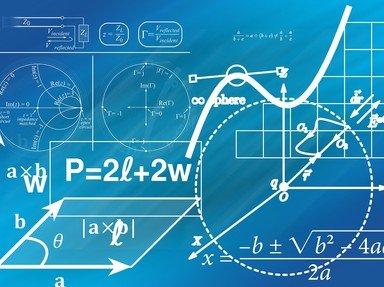Quiz Answer Key and Fun Facts
1. The multiplication principle is an important method of counting. For example, suppose we had a contest that awarded a first prize, a second prize, and a third prize. Suppose also nobody could win more than one prize. If there were 15 people in the contest, then there would be 15 who could win first prize, 14 who could win second, and 13 who could win third. The total number of ways the prizes could be awarded would be 15 * 14 * 13 = 2730 ways.
You can use the multiplication principle to answer the following question:
How many three digit numbers are there? Remember that the first digit cannot be 0.
2. How many three digit numbers are even?
[Once again, we can use the multiplication principle. Count the number of possibilities for each digit, but keep in mind that an even number can only end in certain digits.]
3. How many three digit numbers have no repeated digits?
[Be careful with this one. The second digit cannot be the same as the first digit, but 0 can be used as the second digit. The third digit cannot be the same as either of the first two digits.]
4. How many three digit numbers have at least one repeated digit?
[For this problem, note that if we added (the number of three digit numbers that had no repeated digits) to (the number of three digit numbers with at least one repeated digit), we would obtain (the total number of three digit numbers). Two of the quantities in parentheses have already been computed.]
5. How many three digit numbers contain the digit 0?
[For this problem, let's try a procedure analagous to the one we used in question 4. Note that (the number of three digit numbers that don't contain the digit 0) + (the number of three digit numbers that contain 0) = (the total number of three digit numbers).]
6. How many three digit numbers are divisible by 7?
[This problem is different. For example, to find the number of positive integers less than 1000 that are divisible by 17, divide 1000 by 17. You will get a quotient of 58 and a remainder of 14. This means that there are 58 positive integers that are less than 1000 that are divisible by 17. But if you want the number of three digit numbers divisible by 17, you would also have to find the number of positive integers less than 100 that are divisible by 17 by division.]
7. How many three digit numbers are perfect squares?
[For this one you will need to look at square roots. Don't count the numbers less than 100.]
8. How many three digit numbers have their digits in increasing order (such as 358)? Note also that the digits cannot be repeated.
[This one is a little tricky. Note that there are 3 * 2 * 1 = 6 ways the digits of any particular three digit number can be arranged to form a three digit number with the same digits. For example, the digits in the number 385 can be rearranged to form a total of six different three digit numbers (including 385 itself): 385, 358, 538, 583, 835, 853. Only one of these ways, 358, has the digits in increasing order. So if we counted all the three digit numbers with no digits that repeat that don't contain zero, we would get six times the answer to the question.]
9. How many three digit numbers have their digits in decreasing order (such as 820)? Note also that the digits cannot be repeated.
[This one is similar to the last question, but it has a different answer since 0 may appear in the number.]
10. Finally, how many three digit numbers are there whose digits sum to 5?
[For this problem, you can list all the possibilities rather quickly by the following method. First of all, the first digit can be 1, 2, 3, 4, or 5. Now if the first digit is 1, the second digit can be 0, 1, 2, 3, or 4. Keep going, you'll quickly come up with all of them.]
Source: Author
rodney_indy
This quiz was reviewed by FunTrivia editor
crisw before going online.
Any errors found in FunTrivia content are routinely corrected through our feedback system.

